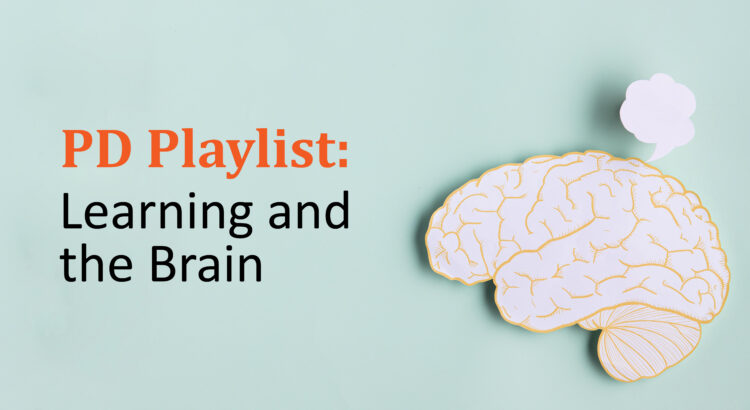To help anyone interested in finding out more about helping students use research-based techniques to improve learning, TCDC has compiled another “PD Playlist.” We’ve arranged the resources from “in-person event” and “sound bite” to “radio play” to “extended dance mix” and “full LP.” Some options will take just a few minutes of your time while others will require a longer commitment.
Visit the TCDC site, to view the entire catalogue of PD Playlists.
March’s PD Playlist
In-Person Event
Attend the TCDC Lunch and Learn: Strategies for Long-term Learning on March 27th 2023 from 12:00 pm-1:30 pm. For more information and to register for this Lunch and Learn session, please visit the registration page.
Sound Bites <10 minutes
Retrieval Practice: The Most Powerful Learning Strategy You’re Not Using (article | 00:07:00)
The article explains what retrieval practice is and the research behind this approach. Author Jennifer Gonzalez lays out great examples of retrieval practice for your classroom and discusses some considerations you might want to know before practicing retrieval with your students.
Radio Play<20 minutes
Learning styles & the importance of critical self-reflection | Tesia Marshik (TEDx Talk | 00:18:14)
The belief in learning styles is so widespread that few people ever challenge this belief, which has been deeply ingrained in our educational system. Dr Marshik’s presentation focuses on debunking this myth via research findings, explaining how/why the belief in learning styles is problematic, and examining the reasons why the belief persists despite the lack of evidence.
Optimizing Learning in College: Tips from Cognitive Psychology (article | 00:23:00)
The article draws on research in cognitive psychology and the experience of educators to provide suggestions about how students should approach taking a course in college. The authors discuss time management techniques, identify the ineffective study strategies students often use, and suggest more effective strategies based on research in the lab and the classroom.
Extended Dance Mix <60 minutes
10 Creative Online Assignment Ideas That Promote Critical Thinking, Engagement and Deep Learning (Go2K webinar | 01:02:00)
In this engaging webinar, Dr Jean Mandernach explores 10 creative online assignment ideas that promote critical thinking, analysis, engagement, and deep learning–all in a manner that can be realistically integrated into the online classroom but that can also be adapted to in-person courses.
Full LP >1 hour
Retrieval Practice: The Most Powerful Learning Strategy You’re Not Using (podcast | 01:00:00)
In this episode of The Cult of Pedagogy Podcast, author Jennifer Gonzalez interviews cognitive scientist Dr Pooja Agarwal for a deeper dive on Retrieval Practice and the impact of this practice on student learning.
For your students:
Sound Bites <10 minutes
Note-taking Cheat Codes (article + video clips| 00:04:00)
Note-taking cheating codes are great strategies to help students improve their note-taking skills and be better prepared for assessments.
Radio Play<20 minutes
21 Savage Student Learning Tips: Notetaking (video | 00:09:35)
Note-taking is essential to students’ academic success, especially in college! If they take good notes, they have a strong foundation for success. What are good and bad notes? This video provides the clarity students need to make the most out of notetaking.
Full LP >1 hour
Study Skills: Student Cognition Toolbox (course | 03:00:00)
The Student Cognition Toolbox (SCT) is a short course companion (or “sidecar”) introducing and providing direct practice in study strategies that are informed by learning science research. In this version of the SCT, material from introductory psychology is used to illustrate the application of the study strategies. This version has been used in psychology courses and in courses from across the curriculum.
Learning How to Learn: Powerful mental tools to help you master tough subjects (course | 15:00:00)
This course gives you easy access to the invaluable learning techniques used by experts in art, music, literature, math, science, sports, and many other disciplines. We’ll learn about how the brain uses two very different learning modes and how it encapsulates (“chunks”) information. We’ll also cover illusions of learning, memory techniques, dealing with procrastination, and best practices shown by research to be most effective in helping you master tough subjects.
Image by Freepik

